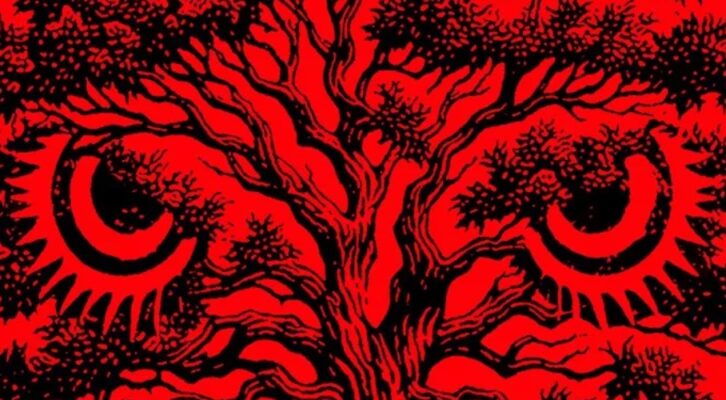Unhappy National Poetry Month: Seven Poetry Books to Read This April
Christopher Spaide Recommends Esther Kondo Heller, Jack Saebyok Jung, Antonio Gamoneda and More
Pity National Poetry Month. It could have been any of the twelve months, but for three decades running it’s been April—month of practical jokers, rain showers, and last-minute tax filing. It’s also the cruellest month, which some of us sensed before ever reading the thundering opening to T.S. Eliot’s The Waste Land (1922). Take it from John Ashbery, who once capped Eliot’s famous first line with a verbal shrug: “‘April is the cruellest month’—but it is April, after all.”
As this April approached, I kept thinking of—and grumbling over—another line of Eliot’s: “no art is more stubbornly national than poetry.” If this spring’s outstanding collections are any indication, Eliot couldn’t be more wrong. This National Poetry Month, I consumed and was consumed by work in translation (Antonio Gamoneda by way of Katherine M. Hedeen and Víctor Rodríguez Núñez, Rumi by way of Haleh Liza Gafori), original collections from award-winning translators of Asian poetry (Jack Saebyok Jung, Arthur Sze), and Anglophone poets from outside of the United States (the Kenyan German poet, critic, and filmmaker Esther Kondo Heller, the Canadian poet Karen Solie).
And in his latest collection, Cedar Sigo, an enrolled member of the Suquamish nation, imagines an artistry that won’t stay put in any one nation, let alone on one planet. Take it from his poem “The Life of Sun Ra,” which finds common galactic ground with the Afrofuturist polymath of its title:
I can relate to his premise, that he was born on Saturn
and must be getting back soon,
that the earth is a failed planet,
that rehearsal itself
______________becomes a ceremony.
*
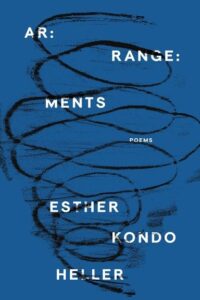
Esther Kondo Heller, Ar:range:ments (Fonograf Editions)
Ar:range:ments—a recognizable English word ever so slightly deranged by punctuation, challenging the eye but neatly parsing syllables for the ear—is the title of Esther Kondo Heller’s first book. It’s also an apt label for the visuoverbal works they create: page-ranging ar:range:ments of image and text, quotation and collage, English and German and Swahili and the stray graphemes that flake off of them. In the book’s first pages, as Kondo Heller remembers a “long dead” mother and addresses her as “Mama,” the word “arrangements” assumes several more meanings, practical as well as mystical: “I know that you made arrangements—I hear them in the conch, the ocean, in the static, the silence of your holy arrangement followed by every utterance.”
Not every page of Ar:range:ments speaks to or about that mother, who nevertheless seems to be everywhere and nowhere for Kondo Heller, a multilingual artist who can discern the German word Mutter (or mother) in every muttering utterance, and who acknowledges the physical and psychic burdens of always carrying “My mama’s passing on my lips”: “What does it mean to be whole? My mouth is a black hole, that I have tried to speak through in whatever language is needed, since she died.”
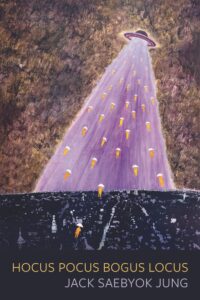
Jack Saebyok Jung, Hocus Pocus Bogus Locus (Black Square Editions)
Every time I read out the title of Jack Saebyok Jung’s début collection, I hear something different. Hocus Pocus Bogus Locus: Is that a magic spell? Mumbo-jumbo, or calling out mumbo-jumbo—what’s fake (or bogus) about your place (or locus)? A word game with unspoken rules, or a bad-luck streak of Wordle guesses? Jung’s poems have all those ways with words, plus something rarer: an irreverent, irony-happy sensibility that keeps all language at arm’s length, the better to rework and replay it.
That sensibility serves Jung well as a translator of the Korean writers Yi Sang and Kim Hyesoon; in this collection, it makes him a virtuoso at tongue-twisting—“Desecrated deserter secretes secrets”—and a doting parodist of familiar poetic genres. Take “Sukiyaki,” a variation on Li-Young Lee’s “Persimmons,” with its racialized scenes of pronouncing and mispronouncing English words, but also a portrait of the artist as a potty-mouthed man: “Whenever I mean to say path, I end up / saying pass or passed. I get pissed and forget / my past: apologizing for how I say shit / whenever I mean to say sheet, writing shit on shit.”
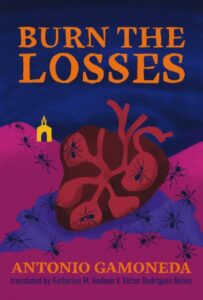
Antonio Gamoneda, Burn the Losses, translated from the Spanish by Katherine M. Hedeen and Víctor Rodríguez Núñez (Action Books)
Written over eleven years then restlessly revised, published in Spanish in 2003 (as Arden las pérdidas) and just now translated to English, Antonio Gamoneda’s Burn the Losses can stop you short with its flashbang of a first sentence: “The light boils beneath my eyelids.” Gamoneda, now 93, was born right before the Spanish Civil War, which left hundreds of thousands dead or disappeared; his first book appeared during Franco’s repressive dictatorship.
The twinned difficulties of remembering brutality and of forgetting it engender the thrilling paradoxes of the book’s style—at once dialed up and burnt out, with hallucinatory shudders of violence and a near-absence of dates and names of people or places. Katherine M. Hedeen and Víctor Rodríguez Núñez’s translation captures Gamoneda’s formal extremes, from his smoldering epigrams—“I believe in the disappearance. // Believe in the ire”—to his wrenching enjambments, which strew catalogues of dismemberment and disintegration down his poems’ jagged margins.
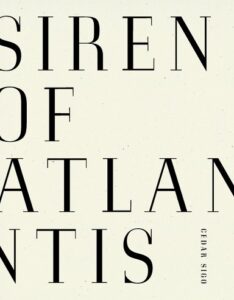
Cedar Sigo, Siren of Atlantis (Wave Books)
“a Polaroid / treatment of despairing / poets / dissolving into / flecks / of sunlight.” “Star Jasmine,” a sequence for the late poet Bernadette Mayer, fondly imitating her conversational quickness, love of lists, and dreamy meanderings. “Ode to The Hi-way House,” spilling retroactive tea on generations of frisky poetry students: “Let’s think back on all the poets that may have flirted in this room / or fucked or tried to or met often, in semi secrecy several times a week.”
Cedar Sigo’s Siren of Atlantis begins with these tributes to fellow poets and artistic beacons, until suddenly everything halts: “I suffered a stroke in late July of 2022. As I was reentering my body, I decided to try writing poetry again.” From the series he wrote immediately afterward to the book’s final poem (dated “September 26–30, 2023”), Siren of Atlantis finds Sigo reorienting his body and mind, dipping into new forms in every poem, and reflecting on his practice as he relearns it, one lapidary word at a time: “I only use words like stones because we are far away.”

Karen Solie, Wellwater (House of Anansi)
Since 2001, a new Karen Solie book has arrived every five years or so; every five years or so, I find myself becoming even more impatient for what her poetry so singularly (yet so abundantly) brings. Similes that step casually from the concrete into the abstract, as if they’re adjacent rooms: “The basement is a treehouse in the roots, / think of it that way, / and cold on five sides, like childhood.” Animal poems, like “Antelope,” with unprecedented but immediately apprehensible noticings in their very first sentences: “They appear out of nowhere as if they know where all the doors are / between our dimension and where they are called / by their true name, are not the last survivors / of their evolutionary niche.”
And, paradoxically, a consistent knack for surprise, for finding ways to develop a style that, one book back, felt fully realized. The surprises of Wellwater, Solie’s sixth collection, include preoccupations with environmental catastrophes in rural Canada and housing crises in its cities, the inarguable philosophizing of a five-year-old nephew, and—the source of her most touchingly withheld elegies to date—the death of her father, at once lingering around and nowhere to be seen, leaving behind “this halfway sense of being neither here nor there.”

Rumi, Water, translated from the Farsi and with an introduction by Haleh Liza Gafori (NYRB Classics)
For many contemporary Anglophone readers, the thirteenth-century Sufi mystic and Persian poet Rumi first spoke out loud and bold in Gold (2022), a selection of forthright, tuneful translations by the Iranian American writer and musician Haleh Liza Gafori. Water, Gafori’s new volume, is both a sequel and a counter-truth: if “Gold highlights Rumi’s rhapsodic, ecstatic side,” then “Water, by contrast, is Gold’s moody cousin,” she explains.
Water, for Gafori’s Rumi, is a versatile, metamorphosing substance, here a fountain, there a torrent, alternately refreshing and engulfing us, extinguishing our passions and cleaning us up: “You can’t put out fire, dear boy, / with another fire. // You can’t wash my heart’s open wound / with another’s blood.” Water’s the right medium for a pervading capital-L Love—or, more exactly, for Love’s motions via “Tender waves” and “streams flowing through paradise.” Like the most engaging playlists, Gafori’s selection boasts idiosyncratic connections and ear-catching tempo changes, from sequences and litanies to unimprovably terse epigrams: “Beloved, when your sweetness rains down / the price of rock candy plummets.”
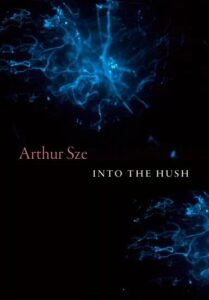
Arthur Sze, Into the Hush (Copper Canyon Press)
Into the Hush, Arthur Sze’s first collection since The Glass Constellation: New and Collected Poems (2021), is another reminder that he deserves the lifetime achievements he’s been winning on a yearly basis—and a reminder that a lifetime is only one timescale encompassed by Sze’s dimension-bending poems. “Anvil,” the book’s one-sentence opener, superimposes moments and millennia, stacking up seventeen clauses starting with “when”: “When a black butterfly flits past, // when you glimpse the outlines of apple trees, // when you smell the sprig of sunrise and walk up to the ditch, // when Bering Aleut, Juma, Tuscarora join the list of vanished languages…”
Time’s top-heavy weight, Sze’s last line reveals, is all raw material for the shaping: “here is the anvil on which to hammer your days—.” Twelve collections in, Sze is still checking off new forms (zuihitsu, haibun, pantoum), and still devising novel ways to compact global English to lyric proportions. One poem begins with the chemical equation for photosynthesis; another lets an eraser speak, and hush up: “when you look at th q ck br wn f x j mp d v r th l zy d g and find I’ve lifted all the vowels loss quickens the world.”
Christopher Spaide
Christopher Spaide is an Assistant Professor of English at the University of Southern Mississippi. His academic writing on modern and contemporary poetry (as well as music and comics) appears in American Literary History, The Cambridge Quarterly, College Literature, Contemporary Literature, ELH, The Wallace Stevens Journal, and several edited collections. His essays and reviews and his poems appear in The Boston Globe, Boston Review, Lana Turner, The Nation, The New Yorker, Ploughshares, Poetry, Slate, and The Yale Review, and he has been a poetry columnist for the Poetry Foundation and LitHub. He has received fellowships from the Fox Center for Humanistic Inquiry at Emory University, the Harvard Society of Fellows, the James Merrill House, and the Keasbey Foundation; for his academic writing and criticism, he has received prizes from Post45 and The Sewanee Review. Currently, he serves as the Secretary for The Wallace Stevens Society. He is the literary executor for Helen Vendler.











